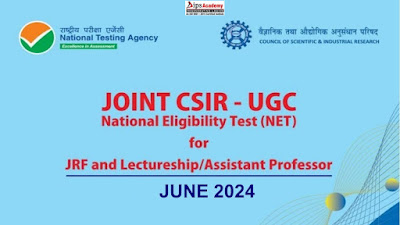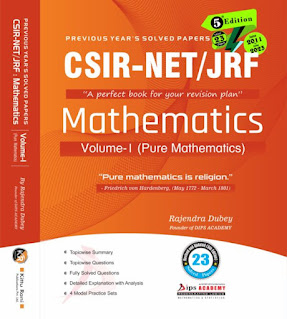The journey of cracking competitive exams like CSIR NET Maths and IIT JAM Maths requires not only hard work but also right guidance, structured learning, and timely decision-making. If you’ve been waiting for the right time to join a comprehensive preparation course, the moment is here. DIPS Academy’s Grab-or-Gone Offer brings up to 50% discount on the most popular courses for CSIR NET/JRF Dec 2025 and IIT JAM Maths 2026, available both Online and Offline.
With limited seats and massive benefits, this offer is designed for students who are ready to take action and get top-quality coaching at lowest cost.
What is the Grab or Gone Offer?
DIPS Academy is going to launch a special Grab or Gone Offer as a limited-time opportunity to help serious aspirants get enrolled in their highly rated batches for CSIR NET and IIT JAM preparation.
Key Highlights:
- Up to 50% Fee Discount
- Valid on Online + Offline Classroom Batches
- Applies to both Regular and Weekend batches
- Available for first 100 students only
- Access to Live Classes, Video Lectures, Study Materials, and Test Series
This offer is more than just a discount, it provides a gateway to structured mentorship, rigorous preparation, and continuous performance tracking, whether you prefer studying from home or attending classes at the academy.
Courses Covered Under the Offer
1. CSIR NET/JRF Mathematics – December 2025 Attempt
This course is designed for postgraduate students preparing for the December 2025 CSIR NET/JRF exam in Mathematics. It covers:
- Complete syllabus coverage as per CSIR guidelines
- Online + Offline modes available
- Regular and Weekend options to suit all schedules
- Live Classes + Recorded Backup
- Printed study materials
- Weekly assignments and tests
- Full-Length Test Series closer to the exam
Whether you're starting from scratch or looking to improve your previous attempt, this course structure supports all levels of learners.
2. IIT JAM Mathematics – 2026 Attempt
Students aiming for admission to M.Sc. Mathematics programs via IIT JAM 2026 can choose from:
- Regular Batches for daily engagement
- Weekend Batches for working or college-going students
- Live Interactive Sessions with expert faculty
- Complete topic-wise study material
- Doubt-clearing sessions and progress assessments
- Previous year paper discussions and mock test practice
This course is available in both online and offline formats, providing flexibility and accessibility.
Why Choose DIPS Academy?
Proven Track Record
DIPS Academy has successfully guided thousands of students in clearing CSIR NET and IIT JAM exams. Every year, its results consistently showcase the high quality of coaching, with many students achieving top ranks.
Experienced Faculty
Our classes are conducted by expert mentors who bring decades of teaching experience and deep subject knowledge. The teaching method focus on making sure you clearly understand key concepts, can solve problems logically, and are well-prepared for exams.
Hybrid Learning Model
Whether you choose offline classes or join online classes, you'll get the same quality, same teachers, and same benefits. Our live classes are streamed with interaction features, and recorded videos help in revisiting complex topics anytime.
Affordable Learning
With the Grab-or-Gone Offer, students can access all these benefits at the lowest-ever fees. This offer is DIPS Academy’s way of supporting deserving candidates, especially those who face financial constraints but have a strong determination to succeed.
Features of the Grab or Gone Offer
Who Should Avail This Offer?
- Final year UG/PG students preparing for JAM or CSIR NET
- Repeater students who want to improve their ranks
- Working professionals or college students looking for flexible learning options
- Students from remote areas who need quality coaching at home
- Budget-conscious aspirants seeking affordable education
If you fit into any of these categories, this offer is a chance you don’t want to miss.
Limited Seats – Act Fast!
This is a limited-time offer, We're offering our Grab-or-Gone deal to the first 200 students who sign up. Once these seats are filled, our fees will return to their standard rates.
If you've been thinking about enrolling for IIT JAM or CSIR NET preparation, this is the best time to take action.
Conclusion
Competitive exams like CSIR NET/JRF and IIT JAM require more than just preparation, they need strategy, expert guidance, and quality study materials. With DIPS Academy’s Grab-or-Gone Offer, you get all of that with up to 50% savings, both in Online and Offline formats.
Seats are filling fast. Don’t wait. Secure your spot now, join a results-focused learning path, and take the next step toward your academic goals.
FAQs For Grab-or-Gone offer
1. Which courses are included in Grab-or-Gone Offer?
The offer is applicable on the following courses:
- CSIR NET/JRF Mathematics – December 2025 Batch (Online/Offline)
- IIT JAM Mathematics – 2026 Batch (Regular/Weekend, Online/Offline)
- Video Lecture Packages for both exams
2. Is the offer available for both online and offline classes?
Yes, the offer is valid for both online live classes and offline classroom programs conducted at the Delhi centre.
3. Who is eligible to apply for this offer?
This offer is available to students who are preparing for CSIR NET/JRF Maths Dec 2025 or IIT JAM Maths 2026, The first 200 registrants can avail this offer.
4. How can I enroll under the Grab-or-Gone Offer?
You can enroll by visiting the official DIPS Academy website, choose your desired batch, fill out the registration form, and complete the payment at the discounted rate.
5. How Long is the Grab-or-Gone Offer Valid?
The Grab-or-Gone offer is a limited-time offer, available only for a short duration. To get the discounted fee and secure your spot, it's highly recommended to enroll as early as possible before the offer ends.










